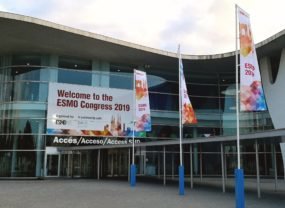ESMO Congress 2019 held in Barcelona, Spain, from 27 September to 1 October 2019
‘Translating science into better cancer patient care’, the tagline of the ESMO Congress 2019 held in Barcelona, Spain, from 27 September to 1 October, sits at the core of oncology research with the potential to transform tomorrow’s treatments. Oncology research has advanced at such an unprecedented pace over the last decade that new opportunities for patient care cannot be created by professionals working in silos. Organised in partnership with the European Association for Cancer Research (EACR), the ESMO Congress 2019 represents the largest event in Europe for the exchange of ideas between researchers and clinicians.
"In recent years, there has been major progress in the diagnosis and treatment of patients with cancer, which has come about through an in-depth understanding of cancer biology at the tumour and patient level,” says Prof. Jean-Yves Blay from the Centre Léon Bérard in Lyon, France, who is ESMO Scientific Co-Chair of the Congress starting today in Barcelona. With this year’s tagline, ‘Translating science into better cancer patient care’, high relevance is given to novel approaches and breakthroughs that can drive advances along the three-stage course of cancer care, from laboratories to clinical settings and from clinical settings to the patient’s bedside.
"The term ‘translation of research findings’ is crucial,” continues Blay, "and I believe that the progress we have already made and will continue to make in the future will always come from in-depth knowledge of biology.” Prof. Anton Berns from The Netherlands Cancer Institute, Amsterdam, EACR Scientific Co-Chair of the Congress thinks the event offers an opportunity for both basic and clinical investigators to learn from each other and identify opportunities for collaborations to bridge the gap between basic and clinical research. This is, in the end, the key for advancing patient care. "We need to figure out how we can better implement research ideas and learn from clinical experience, and the ESMO Congress provides an occasion to reflect on and adjust our research efforts based on critical issues that arise in the clinic,” he says.
A key role to ensure that major advances in the field reach patients in a timely and convenient way is also played by oncology nurses. "Many cancer nurses are at the bedside 24/7, thus ideally placed to evaluate cancer treatments and highlight clinical improvements to researchers,” explains Dr Lena Sharp from the Regional Cancer Centre, Stockholm, Sweden, from the European Oncology Nursing Society (EONS). "This can help us ask the most pertinent research questions and shape future studies.” At today’s Opening Ceremony, EONS President Andreas Charalambous taking over from Sharp, will present the EONS Congress which complements the ESMO Congress programme for the second year. This will likely help to lead to major recognition for specialistic cancer nurses and help progress nurse-led clinical practice, including education for patients and carers, preventative medicine, palliative care, symptom management and psychosocial support. Appropriately, patients participate in a number of sessions in the EONS programme, which may help to connect research ideas and findings to clinical practice.
This year, more than 2,200 abstracts will be presented at the ESMO Congress, with 93 late-breaking abstracts. Key results from practice-changing studies will be presented at Presidential Symposia including the extended benefits of PARP inhibitors to more subgroups of patients with ovarian cancer and metastatic castration-resistant prostate cancer. Also, overall survival data are much awaited from combination therapies in patients with HER+/HER2- advanced breast cancer.
Immunotherapy will likely continue to lead the global oncology scene. A lot of research energy is spent on trying to unravel the underlying mechanisms of intrinsic and acquired resistance to immunotherapy and other treatments, according to Berns. "Studies are now beginning to reveal the underlying causes of resistance arises and, more importantly, how we can improve responses and minimise the impact of resistance, which is really exciting”, he comments. "These studies will help us define more effective treatment combinations or alternative treatment schedules that could overcome resistance.” While empirical treatment still has a role in the immediate future of oncology care, Blay believes this will progressively disappear in favour of a more rational approach based on our greater understanding of tumours and resistance mechanisms. "However,” he advises, "this change in approach requires the integration of basic, translational and clinical research, alongside information on long-term outcomes, especially regarding managing treatment sequelae and secondary cancers in previously cured patients.”






